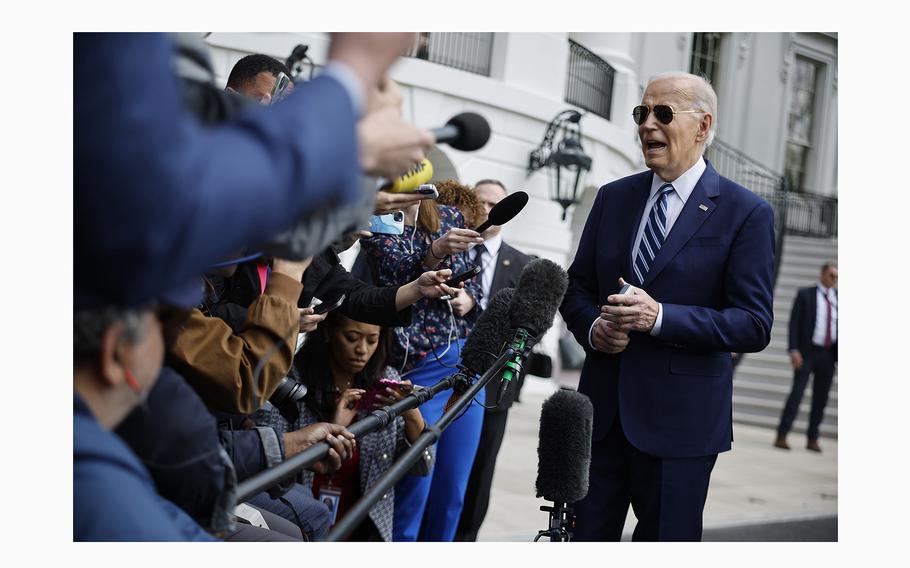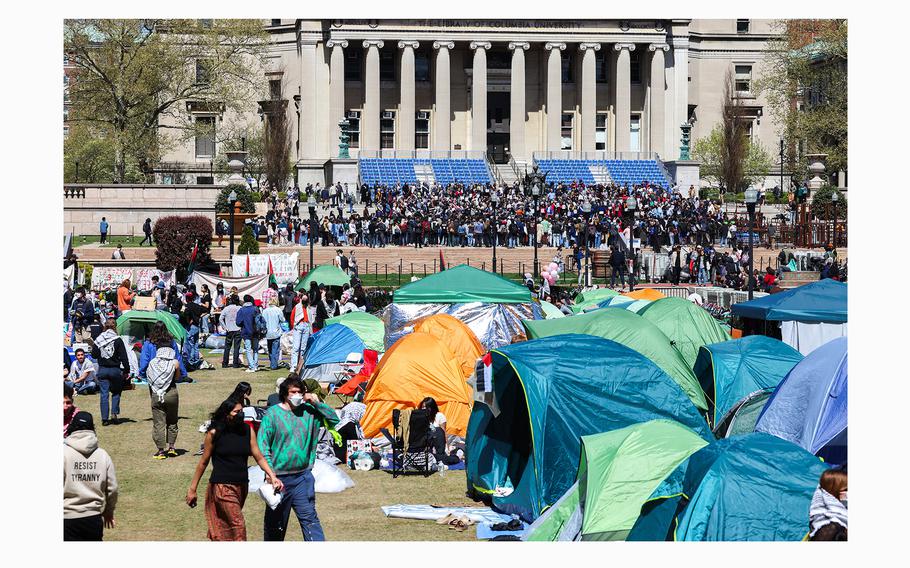
President Joe Biden briefly speaks to reporters as he departs the White House on April 25, 2024 in Washington, D.C. (Chip Somodevilla/Getty Images/TNS)
NEW YORK (Tribune News Service) — The pro-Palestinian protests roiling Columbia University and college campuses nationwide have political pundits asking whether widespread demonstrations could ruin the Democratic National Convention in Chicago this summer, just as they did two generations ago in 1968.
Hundreds of Columbia students this month erected a tent city encampment to protest Israel’s war in Gaza, spurring the university administration to call in police to clear the Manhattan campus and make scores of arrests.
Like in the ’60s, when police crackdowns emboldened youthful anti-war protesters, the New York City Police Department action failed to quell the Gaza protests. The student demonstrators returned in force hours later and have vowed not to back down.
Gaza protests have spread like wildfire on college campuses in recent days, with thousands of students calling for the U.S. to end its support for Israel and demanding their institutions cut ties with companies that do business in the Jewish state.
The growing movement poses a political threat to President Joe Biden, who has for the most part strongly backed the U.S. ally. and recently approved billions in additional military aid. Polls show especially younger voters disapprove of his handling of the conflict.
With Biden locked in a tight reelection fight, images of chaos on the streets of the liberal city when Democrats gather to nominate him for a second term threaten to turn off moderate and independent suburban voters who will likely decide the election.
It could also short-circuit Biden’s effort to launch his campaign in earnest by showing off a unified and determined Democratic Party.
“Chicago ’24 could be a powder keg,” said Matt Mackowiak, a Republican strategist. “The Democrats have a massive risk of letting activists define the event and scare swing voters.”
But Democratic strategist Basil Smikle believes the specter of former President Donald Trump’s effort to get back to the White House will be a powerful unifying incentive for Democratic voters even in the face of divisive anti-Israel protests.
“It’s safe to assume, as in years past, that there will be some kind of protest at or near the convention,” said Smikle, a Hunter College political science professor. “But I don’t feel it will detract from the larger message and mission, which is to beat Donald Trump.”
“The Biden agenda will prove more appealing, and the Trump agenda too extreme, to opt out of this election,” Smikle added.

People rally and camp at Columbia University, occupied by pro-Palestian protesters, in New York on Monday, April 22, 2024. (Charly Triballeau/AFP/Getty Images/TNS)
The fact that anyone is even bringing up comparisons to the 1968 Democratic National Convention in Chicago has to be troubling for the Biden campaign and Democrats.
The 1968 gathering came as Democrats were wrestling with the divisive Vietnam War. The civil rights movement was also spreading across the nation and riots erupted in major cities after the assassination of Dr. Martin Luther King Jr. in April of that year.
Vice President Hubert Humphrey, a supporter of the Vietnam War, locked up the Democratic nomination with the support of party bosses even though he didn’t participate in primary elections. The nomination contest was thrown into chaos when his main rival, Robert F. Kennedy, was also felled by an assassin’s bullet.
The Chicago convention itself was deeply split between pro- and anti-war delegates. On the muggy streets outside, huge and angry crowds of protesters gathered to demand an end to the war and justice for Black Americans.
The raging bloody battles turned into an iconic image of American division, especially between the long-haired leftist protesters and the nearly all-white phalanxes of baton-wielding Chicago cops.
Republican Richard Nixon successfully used the Chicago chaos convention to portray Democrats as unable to control their own supporters. Months later, he edged Humphrey to win the White House.
GOP strategist Scott Jennings predicted Biden would be put in a similar political vice when Palestinian supporters run amok and force Democratic authorities to crack down.
“And I think Biden will try to ‘fine people on both sides’ it,” Jennings said, referring to Trump’s damaging effort to downplay the 2017 white nationalist rally in Charlottesville, Virginia.
The 2024 Democratic convention is only the second time since then that Democrats have brought their signature event back to the Windy City.
It’s a decision that raised eyebrows from the beginning, albeit mostly because party nomination conventions have recently been held in battleground states to maximize a possible bounce among local voters.
After Chicago was picked in spring 2023, Hamas terrorists launched a brutal attack on Israel on Oct. 7 that killed more than 1,000. Israel responded with an invasion of the Gaza strip that has continued ever since, so far killing more than 30,000 Palestinians, mostly innocent civilians.
As the Israeli operation has dragged on, pro-Palestinian demonstrations erupted at Columbia, a hotbed for protests in 1968. The demonstrations have grown bigger and spread to dozens of campuses across the nation, just as they did in the 1960s.
Still, comparisons to 1968 seem far-fetched, at least so far.
There have been clashes between police and protesters and Columbia and elsewhere, but not anything close to the scale or intensity of the 1968 tumult.
Perhaps more significantly, the Gaza protests don’t seem to reflect deeper divisions in American society as did civil rights and Vietnam.
Democratic strategist Tom Watson predicted anti-Israel protests won’t threaten wider Democratic determination to beat Trump.
He scoffed at any comparison with the turbulent ’60’s when American soldiers were dying daily in Vietnam and cities were on fire.
“The only thing similar to 1968 is that the (Rolling) Stones are still on tour,” Watson said.
©2024 New York Daily News.
Visit nydailynews.com
Distributed by Tribune Content Agency, LLC.